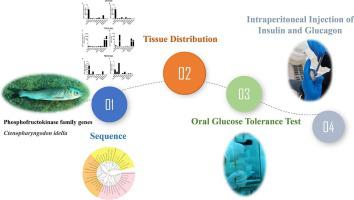Comparative Biochemistry and Physiology B: Biochemistry & Molecular Biology ( IF 2.2 ) Pub Date : 2023-09-04 , DOI: 10.1016/j.cbpb.2023.110898 Yingxin Zhang 1 , Chaobin Qin 2 , Junli Wang 1 , Liping Yang 2 , Xiao Yan 2 , Shaoyang Zhi 2 , Guoxing Nie 2

|
It is widely acknowledged that glucose serves as the primary energy source for organisms. However, fish exhibit persistent postprandial hyperglycemia and are thought to have low glucose tolerance. Glycolysis serves as the ubiquitous pathway for glucose catabolism, with phosphofructokinase (PFK) acting as a crucial rate-limiting enzyme in this process and playing an indispensable role. PFK is classified into three isoforms based on their major expression sites, i.e., PFKM (skeletal muscle type), PFKL (liver type) and PFKP (platelet type). In this study, grass carp (Ctenopharyngodon idella) was used as animal model and the open reading frame (ORF) sequences of six PFK genetic isoforms of grass carp were cloned. Real-time PCR was used to detect its tissue distribution, and expression changes in oral glucose tolerance test (OGTT), insulin and glucagon injection experiments. The results showed that the ORF of pfkla, pfklb, pfkma, pfkmb, pfkpa and pfkpb genes was 2343, 2340, 2355, 2331, 2364 and 2349 bp in length, respectively. The results of tissue distribution showed that pfkla and pfklb, homologous to mammalian pfkl, exhibited low expression levels in the liver of grass carp, but were expressed at the highest level in the brain. Muscle-type pfkma and pfkmb mRNA were found to be highly expressed in both red and white muscle, with pfkmb also exhibiting high expression levels in the heart, while platelet type pfkpa and pfkpb showed high mRNA abundances in the brain and heart. Oral glucose administration stimulated pfkma and pfkmb mRNA expression in the red muscle, and up-regulated pfklb mRNA levels in the liver at 3 h post treatment, but it suppressed liver-type and platelet-type PFK genes expression in the brain. The expression of pfkmb in white muscle and pfkmb and pfkpb in heart were promoted by insulin, whereas the expression of pfkla and pfkpb in the brain, pfkma and pfkmb in the red muscle, pfkma in the white muscle, and pfklb in the liver was suppressed by insulin. As for glucagon, it inhibited pfkma and pfkmb mRNA expression in the red muscle, as well as pfklb in the liver, but it up-regulated PFK genes expression in most tissues detected, such as brain (pfklb, pfkpa and pfkpb), white muscle (pfkma and pfkmb), liver (pfkla) and heart (pfkmb and pfkpb). Our results suggest that PFK family genes have different or even opposite expression patterns in response to glucose, insulin and glucagon stimulation in various tissues of grass carp, which may contribute to glucose intolerance in fish.
中文翻译:

草鱼磷酸果糖激酶家族基因:响应葡萄糖、胰岛素和胰高血糖素的分子鉴定和组织特异性表达
众所周知,葡萄糖是生物体的主要能量来源。然而,鱼类表现出持续的餐后高血糖,并且被认为具有低糖耐量。糖酵解是葡萄糖分解代谢普遍存在的途径,而磷酸果糖激酶(PFK)在此过程中充当关键的限速酶,发挥着不可或缺的作用。PFK根据其主要表达位点分为三种亚型,即PFKM(骨骼肌型)、PFKL(肝脏型)和PFKP(血小板型)。本研究以草鱼(Ctenopharyngodon idella)为动物模型,克隆了草鱼6个PFK基因亚型的开放阅读框(ORF)序列。采用实时荧光定量PCR检测其组织分布以及口服葡萄糖耐量试验(OGTT)、胰岛素和胰高血糖素注射实验中的表达变化。结果表明,pfkla、pfklb、pfkma、pfkmb、pfkpa和pfkpb基因的ORF长度分别为2343、2340、2355、2331、2364和2349 bp。组织分布结果显示,与哺乳动物pfkl同源的pfkla和pfklb在草鱼肝脏中表达量较低,但在脑中表达量最高。肌肉型pfkma和pfkmb mRNA 在红肌肉和白肌肉中均高表达,pfkmb在心脏中也表现出高表达水平,而血小板型pfkpa和pfkpb在大脑和心脏中表现出高 mRNA 丰度。口服葡萄糖刺激红肌中pfkma和pfkmb mRNA表达,并在治疗后3小时上调肝脏中pfklb mRNA水平,但抑制大脑中肝型和血小板型PFK基因的表达。胰岛素促进白肌中pfkmb以及心脏中pfkmb和pfkpb的表达,而抑制脑中pfkla和pfkpb 、红肌中pfkma和pfkmb 、白肌中pfkma和肝脏中pfklb的表达通过胰岛素。至于胰高血糖素,它抑制红肌中的pfkma和pfkmb mRNA 表达,以及肝脏中的pfklb mRNA 表达,但它上调大多数检测到的组织中的 PFK 基因表达,例如大脑。pfklb、pfkpa和pfkpb)、白肌(pfkma和pfkmb)、肝脏(pfkla)和心脏(pfkmb和pfkpb)。我们的研究结果表明,PFK家族基因在草鱼各组织中对葡萄糖、胰岛素和胰高血糖素刺激的反应具有不同甚至相反的表达模式,这可能导致鱼类葡萄糖不耐受。



























 京公网安备 11010802027423号
京公网安备 11010802027423号